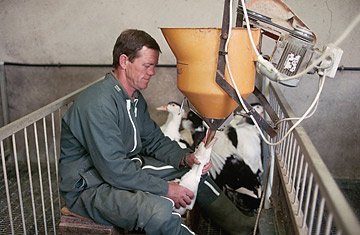
Ducks are forced fed in order to produce foie gras
Most people in America have never heard of, let alone eaten, foie gras. To those who've feasted on fatty duck liver, it's the ultimate indulgence in taste and texture. But even fans of the delicacy can't help but think about how it came to be. To make foie gras, farmers force-feed their fowl via a metal tube inserted in the ducks' throats. Chicago Tribune entertainment reporter Mark Caro was thrust into this very dicey corner of haute cuisine when he wrote a 2005 story about a famous Chi-Town chef's sudden ban on foie gras and the hatred in the foodie community he inspired. (Read "Fight for Your Right to Pâté.")
Caro was intrigued enough by the topic to want to see for himself. He watched the force feeding regimen on farms from California to upstate New York to France, interviewed the dedicated (and often aggressive) animal activists who are trying to shut down the industry and, along the way, confronted his own food demons. Caro, author of a new book about the debate, The Foie Gras Wars, talked to TIME about why Donald Duck is a force to be reckoned with, the true goals of the animal rights camp and why he won't be craving foie gras any time soon. (See TIME's Summer Journey: We Are What We Eat.)
Why does the foie gras issue strike such a chord?
We think of ducks having personalities. You've got Donald Duck. You've got Daffy Duck. You've got the Aflac duck. We think they're spunky little animals and we like them. And the method to produce foie gras is vivid and sounds incredibly unpleasant. Imagine if somebody put a pipe down your throat and filled you up with food. You would be gagging, falling over. But ducks actually breathe through the center of their tongue. They're not gagging and being prevented from breathing. In fact, they store fat in their liver, which is unlike us. But it sounds awful and because most people don't have a stake in it, it's easier to have an opinion — like this is just decadent and mean and the ultimate example of our inhumanity. It's a safe way to say you're sticking up for animals without putting much on the line.
You write about having enjoyed foie gras in the past. Where do you stand now?
The issue of foie gras is not, to me, black and white even knowing what I know. This stuff is really personal and really emotional.
Do you think that the force feeding is torture?
I'm not a duck, so I can't really say how it feels, but the process itself is not a sadistic torturous process. When you look at the ducks that have just been fed and the ones about to be fed, there is not a perceptible difference between them. The counter-argument is that ducks are prey animals and are conditioned not to show you if they're suffering. And if you've got a liver that's 10 times its normal size, a duck is going to be uncomfortable. But a duck being uncomfortable in the last days before it's slaughtered, is that torture? I think of torture as a willful sadistic administration of pain and by that measure, I don't think it is. Torture is one of those loaded words that's effective as propaganda, but not particularly accurate as a description.
Did your reporting make you consider going vegetarian?
It did not. I had stopped eating red meat for a long time. I felt like cows are mammals and they're much closer to us than birds. Then I read like three different sources that said if you're going to eat any meat, it should be beef because cows at least spend half their lives grazing and get to experience their essential cowness, whereas chickens really have no life at all unless you get the free range ones.
Do you think the ultimate goal of the anti-foie gras movement is to turn everyone vegetarian?
That's their dream. The people running the Humane Society and PETA are vegans and they don't believe in exploiting animals for human uses. Period. It's not like most of these people have illusions that we're about to become a vegan country. But they can make their little dents over time in a long-ranging battle. It's a bigger issue than just people fighting over duck livers.
Do you think the foie gras industry will grow, given how successful activists have been at stigmatizing it?
The foie gras industry is in a tricky place right now. I don't think it even has much to do with the foie gras war. It's just that it's so expensive and people aren't spending money at restaurants. Luxury items get affected by the economy.
When's the last time you had foie gras?
I had some friends over a few days before my book came out and had some, but I haven't gone into a restaurant and ordered it in a while. To me, it's one of these things I would have on rare ocassions. Because I did this book on it, the novelty is completely gone. But I think if I wrote a book about brownies, I wouldn't really be craving brownies right now either.
